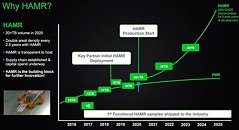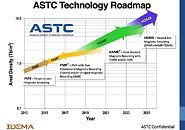Tuesday, November 6th 2018

Seagate's Roadmap Shows How We Can Expect 100 TB HDDs in 2025
Do you know what's better than a 10 TB HDD? A 100 TB HDD. Seagate has published a product roadmap showing the evolution of their HDDs in the next few years. According to that roadmap, we'll be able to buy a 100 TB hard drive in 2025. Other makers such as Western Digital talked about 40 TB drives in 2025 thanks to MAMR (Microwave Assisted Magnetic Recording) technology, but it seems Seagate is even more optimistic, and in fact they'll use HDMR (Heated Dot Magnetic Recording), an evolution of the HAMR (Heat Assisted Magnetic Recording) technology.
Seagate expects to have 20 TB HAMR-HDDs by 2020, and from that moment on they'll continue to work on this technology to launch 36 TB HDDs by 2022, 48 TB drives before 2024 and that 100 TB units in 2025. HAMR will enable double areal density growth each 2.5 years according to Seagate. The current PMR (Perpendicular Magnetic Recording) technology could disappear in that future, and it seems HDDs will continue to be a valuable asset for those who look for the cheapest price per GB.
Source:
Guru3D
Seagate expects to have 20 TB HAMR-HDDs by 2020, and from that moment on they'll continue to work on this technology to launch 36 TB HDDs by 2022, 48 TB drives before 2024 and that 100 TB units in 2025. HAMR will enable double areal density growth each 2.5 years according to Seagate. The current PMR (Perpendicular Magnetic Recording) technology could disappear in that future, and it seems HDDs will continue to be a valuable asset for those who look for the cheapest price per GB.


18 Comments on Seagate's Roadmap Shows How We Can Expect 100 TB HDDs in 2025
Seriously asking. It seems that the HDD cartel is forcefully refusing to let go and help the NAND market grow as intended.
These shouldn't exist. HDDs in 2025 shouldn't exist.
It is strange to call "HDD cartel", in a market where the price of Ram and Nand is artificially manipulated.
How long has it been since it was $1 per megabyte? :eek:
About the cartel, are you telling us that "WD and Seagate" cartel are stopping the NAND cartel (Samsung, Micron, whoever bought Toshiba(WD) and SK Hynix, probably missed 1 or 2) from making cheap and reliable 100TB drives?
If NAND storage is so superior to mechanical drives, it will naturally eliminate it (and it will, but not before 2025). As much as I would like to recycle my 4TB WD greens and replace them with quieter, cooler and faster SSDs, NAND memory is hitting a wall and you can't expect prices to drop as they have been doing in the last 10 years.
*Written on my main pc with no mechanical HDD in it :cool: *
I wouldnt buy this crap for my data even if it would cost 1$ per 1TB.
I am working in data recovery for last 5 years and I see 8 out of 10 HDD are physically damaged Seagates. They cannot even design good head parking mechanism for heads. Their disks comparing to Toshiba or Hitachi are design to fail.
Unless a miracle breakthrough comes about, and considering all my server HDD last about 8 years, I expect I will be running with them long past 2025.
So, TL;DR I don’t know how you can make a blanket statement that no end user computer will have an HDD in 2025.
Greedy people all around us.
Personally i'm much more intrested in Western Digital's MAMR alternative. It supposedly resolves HAMR related reliability issues by using microwaves instead of pure heat. Also slated for next year.
Just let the rust junk die already. Even at 100TB they will never ever be able to match the speed and reliability of nowadays SSDs.